Store closures loom as indie grocer Haldanes calls in administrators
The independent supermarket chain Haldanes looks set to become the latest retail casualty, after filing for an administration order today.
In a statement this afternoon, Arthur Harris, the CEO of Haldanes Stores Ltd and Ruston Retail, said:
“Following advice from our lawyers and an insolvency practitioner, we have made the decision to seek an administration order for Haldanes Stores Limited and Ruston Retail Limited in order to protect our position.
“The directors and I are devastated at having to take this step and our thoughts are with our employees who find themselves facing an uncertain future; we would like to publicly thank them for their efforts and loyalty during their time with Haldanes.”
Though Harris’ statement continues by promising to “work closely with the administrator and do our utmost to secure the future of a group of stores in the Haldanes estate”, BBC News is reporting that most of the stores will close next week (14 June), with four shops likely to be acquired by other retailers.
This accords with the update I received from a Kelso shopper earlier today, who told me that staff in her town’s branch of Haldanes had been informed this morning that the store would close on Tuesday. Kelso’s Haldanes, incidentally, is a store that has been through the whole cycle of Safeway to Morrisons to Somerfield to Co-op, prior to assuming its current tenant.
News of Haldanes’ troubles, while unwelcome, is not completely unexpected. Only yesterday, the Haldanes website was taken down, and my Kelso contact reported that it was “getting desperate in the shop”, with “shelves only half full, great gaps everywhere, and staff walking round saying sorry to customers. What a mess – it just means people are going elsewhere because they can’t shop local.”
For the last month, Haldanes has also been engaged in an extraordinary public dispute with the Co-operative Group, from which it acquired its store estate in late 2009 and early 2010 – a collection of sites, many of them in Scotland, that the Co-op was required to divest following its acquisition of Somerfield.
In a statement last month, Haldanes alleged that the Co-op had “materially breached key terms of the agreements it [Haldanes] and the Co-op entered into and under which it acquired the 26 stores”, and claimed that “if we had been made fully aware of the true trading picture from the outset, we would not have done the deal with the Co-op.”
The Co-op, for its part, claimed that it had started legal proceedings first, seeking to “to recover possession of a number of the 26 stores they bought from us” following “Haldanes’ failure to pay rents owing to the Group.”
At the time, I questioned Arthur Harris about what this implied for the long-term future of the Haldanes chain, given the suggestion in his statement that trading was well below expectations. He responded:
“Haldanes is a solid and robust business with zero debts. I cannot, however, continue to fund this area of the business indefinitely out of my own pocket or from my other business which is why we are focusing our efforts on reaching a quick solution with the Co-op.”
While the Co-op stated that its own legal action had only been “made reluctantly after other avenues had been exhausted”, Harris’ statement today again claims that the Co-op has been unwilling to talk:
“We have made countless attempts to negotiate with the Co-operative Group Limited over the last nine months, all to no avail. As a result, we issued proceedings in the High Court against the Co-op on 10th May 2011. We lodged full details of these proceedings with the High Court and its solicitors yesterday (8th June 2011).
“I am absolutely distraught that it has come to this. We firmly believed that the Co-op would at least sit down with us and hear what we had to say, but they have chosen to either ignore or refuse all of our requests to meet. This has left us with nowhere else to go.”
Whatever the rights or wrongs of the dispute, the whole episode – played out through the media – has come across as unseemly, and has surely absorbed energies that would, ideally, have been invested elsewhere in the business.
With the future of the eponymous Haldanes chain looking bleak, Harris will need to turn attention to his other companies – UGO Stores Limited, Haldanes Express Limited, Bakery Products Limited (the recently acquired Woodhead Bakery business), and the overarching Haldane Retail Group Limited – all of which are “unaffected by this development and will continue to trade as normal.”
However, just as pricing (not competitive enough) and product availability (not good enough) have been problems at Haldanes, there’s still work to do in addressing similar issues at UGO. A month ago, following my visits to the UGO stores in Eston and Hartlepool, I queried UGO’s apparent move away from the everyday low prices (EDLP) strategy that had made Netto successful, as well as the danger of poor availability undermining its pledge to offer a full weekly shop.
Fellow retail blogger, Steve Dresser, drew similar conclusions in a post yesterday, concluding that while “there is potential with the brand, the offer and the stores to do more, [the] fundamentals of product supply and price remain to be resolved in these early days.”
If nothing else, Haldanes’ difficulties underline the huge challenges faced by any new entrant to the cutthroat UK grocery market. The big players not only have established brands and store estates, but also have massive buying power, streamlined supply chains, quality store environments and generally positive customer experiences that are difficult for a newcomer to compete with.
At the beginning, Haldanes sought to differentiate itself by sourcing 35% of its food and drink products locally, though this policy seems to have been downplayed more recently. Positioning itself as a supporter of local producers has worked brilliantly for the North West-based supermarket chain Booths, allowing it to carve a distinctive niche and a brand that stands for clearly-defined values. However, it was always likely to be a less lucrative approach for Haldanes, with a disparate geographical spread of stores, many of those in less upmarket, more price-sensitive locations.
To end, it’s interesting to remind ourselves that barely eighteen months ago, in November 2009, The Grocer ran an article about three newly launched independent retailers – Haldanes, Asco and Alworths, which between them were hoping to open some 180 stores within three or four years. The reality, of course, has been far different, with the Haldanes chain now on the verge of joining the others in the great retail graveyard in the sky.
Perhaps it’s no coincidence that today’s most successful independent retail chains – B&M Bargains, Heron Foods, and the like – are those that have grown steadily but quietly from humble beginnings, rather than fizzling out once the initial fanfare is over.

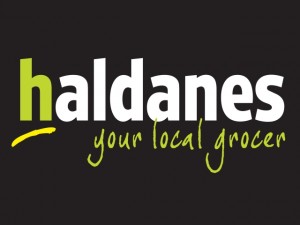
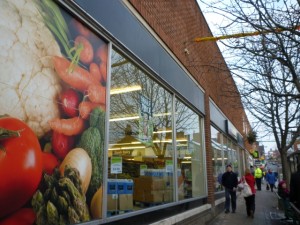
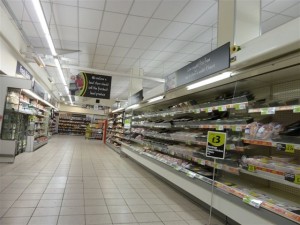
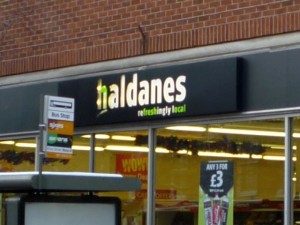

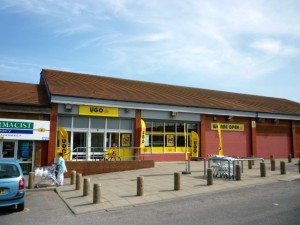
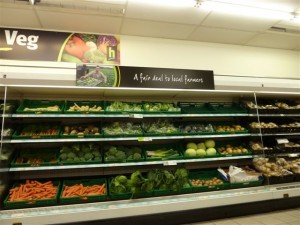
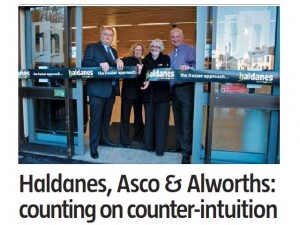
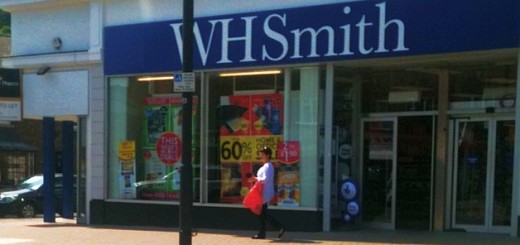
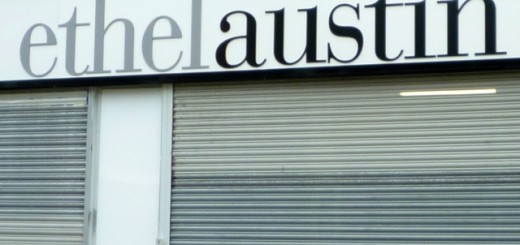

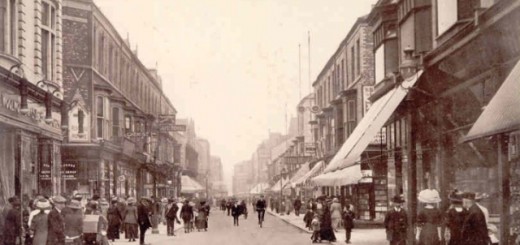



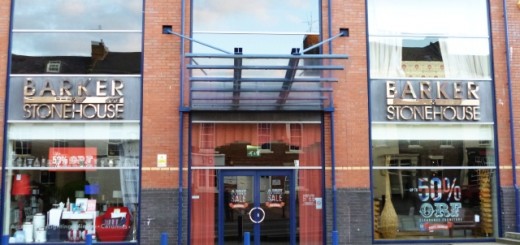

arthur harris told the press that he appointed p&a partnership 93 queen street sheffield s11wf as administrator but they have denied this so all those who have lost there jobs can not claim there money they are owed
Thank you for the update, Martin. I’ll see what I can find out.
There’s a support forum for ex Haldanes/UGO employees been opened here. http://www.larkhall.biz/haldanes
If Arthur Harris has all these other companies, he should be able to pay the staff who are losing their jobs, who have been told that they either won’t get paid or will only get one weeks pay! Most Haldane staff have small contracts, i.e. 6 hours, so that Arthur doesn’t have to pay holiday pay. Their monthly wage is made up of overtime!
Is he going to make sure his shop staff get their full pay or not?
With the future of the eponymous Haldanes chain looking bleak, Harris will need to turn attention to his other companies – UGO Stores Limited, Haldanes Express Limited, Bakery Products Limited (the recently acquired Woodhead Bakery business), and the overarching Haldane Retail Group Limited – all of which are “unaffected by this development and will continue to trade as normal.”
If the above is true then why is the UGO branded store in biddulph S-o-T closing on tuesday 14th June?
That’s interesting, Jack! I can only assume that because the Biddulph UGO was converted from a Haldanes-branded store, the lease is still in the name of Haldanes Stores Ltd, rather than UGO Stores Limited (which runs all the ex-Netto sites acquired from Asda).